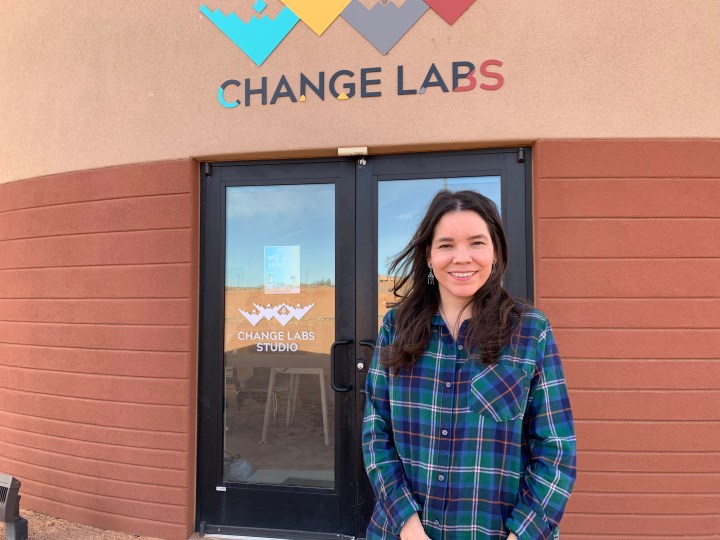
App connects users with native-owned businesses

Tom Deel has been silversmithing for decades but wants to reach more customers. At the moment Deel, who is Navajo and works in Tuba City, Arizona, sells about one piece of jewelry every two months.
“I want to design class rings for high school students but I want to work with turquoise, coral and all those types of stones,” Deel said.
But people don’t know where to find Deel Jewelry. Yet.
Heather Fleming, who runs the Tuba City-based Change Labs, a Native business incubator, helped create Rez Rising, an app that connects users to Native businesses in the southwest — like Deel Jewelry. The app cost about $40,000 to develop.

The Navajo Nation economic development office estimates 42% of Navajos are unemployed. Fleming says many entrepreneurs are included in that number.
“Native people are hyper entrepreneurial,” Fleming said. “You see it on the roadsides. You see it in the flea markets. But when we talk about business on the reservation, people always say, ‘Well, what business?’ And that drives me nuts. Because it doesn’t look like Sonic or Denny’s or Walmart, then it must not be a business.”
A lot of Native American entrepreneurs face obstacles. If they want to use Google to market themselves, for example, they need a physical address. Many roads on reservations aren’t marked.
It can also be tough to operate a website. Only about half of Native Americans living on tribal land have access to high-speed Internet. Fleming says small business owners also need an app that works with a flexible schedule.
“Business is relatively informal,” Fleming said. “You know, one day I might be at the Tuba City flea market, the next week I’m going to be at Kayenta.”
And all entrepreneurs need financial resources. George Joe, who is Navajo, used to run a business magazine that focused on Native American economic issues.
“You need money to place advertisements in newspapers, buy radio spots, which is very difficult for many people on the reservation,” Joe said.
He said it can be hard for Native American businesses to get loans. To get the word out about the Rez Rising app and its 600 or so businesses, Change Labs has spent about $50,000 dollars on publicity. Much of that money has gone to marketing firms to recruit the first users, manage social media and pay for promotional merchandise.
The idea is to appeal to tourists driving to the Grand Canyon. Instead of stopping at fast-food chains, visitors can find a Navajo food stand. Singer Horse Capture, who did the research for the app, says she also wants Rez Rising to appeal to people living on the reservation.
“If they have a car problem they can go to Rez Rising rather than just driving to Flagstaff … and search for a mechanic, find someone who’s also native and who lives closer to them,” Horse Capture said.
The economic development division of the Diné Policy Institute has estimated that more than 70% of local income leaves the tribal area, when people go to buy groceries, or pay for other goods and services in places like Flagstaff or Albuquerque.
“What we have on the homepage is three different search fields,” Horse Capture said. “So you can look for a keyword. You can put in a location and then we also have categories.”
There’s an agriculture category and a ceremony category. One thing you won’t find is a rating system. Horse Capture says the business owners didn’t want to compete like that; users have to try a business for themselves and decide if they like it.
There’s a lot happening in the world. Through it all, Marketplace is here for you.
You rely on Marketplace to break down the world’s events and tell you how it affects you in a fact-based, approachable way. We rely on your financial support to keep making that possible.
Your donation today powers the independent journalism that you rely on. For just $5/month, you can help sustain Marketplace so we can keep reporting on the things that matter to you.












